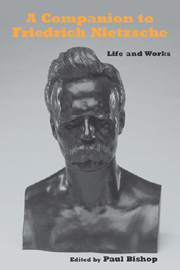Book contents
- Frontmatter
- Contents
- Acknowledgments
- A Note on Editions and Abbreviations
- Introduction
- Link to Nietzsche's Early Writings
- Link to The Birth of Tragedy
- Link to Untimely Meditations
- Link to Human, All Too Human
- Link to Daybreak
- Link to The Gay Science
- Link to Zarathustra
- Link to Beyond Good and Evil
- Link to On the Genealogy of Morals
- Link to The Case of Wagner and Nietzsche contra Wagner
- Link to Twilight of the Idols, The Anti-Christ, and Ecce Homo
- 11 Twilight of the Idols
- 12 The Anti-Christ
- 13 Ecce Homo
- 14 Dithyrambs of Dionysos
- Link to the Nachlass
- Conclusion
- Notes on the Contributors
- Index
11 - Twilight of the Idols
from Link to Twilight of the Idols, The Anti-Christ, and Ecce Homo
Published online by Cambridge University Press: 05 February 2013
- Frontmatter
- Contents
- Acknowledgments
- A Note on Editions and Abbreviations
- Introduction
- Link to Nietzsche's Early Writings
- Link to The Birth of Tragedy
- Link to Untimely Meditations
- Link to Human, All Too Human
- Link to Daybreak
- Link to The Gay Science
- Link to Zarathustra
- Link to Beyond Good and Evil
- Link to On the Genealogy of Morals
- Link to The Case of Wagner and Nietzsche contra Wagner
- Link to Twilight of the Idols, The Anti-Christ, and Ecce Homo
- 11 Twilight of the Idols
- 12 The Anti-Christ
- 13 Ecce Homo
- 14 Dithyrambs of Dionysos
- Link to the Nachlass
- Conclusion
- Notes on the Contributors
- Index
Summary
The Preamble to Nietzsche's Mental Collapse
The great tragedy of Nietzsche's mental breakdown is compounded by the fact that, by the time of his last year of sanity, he had severed his connections with those formerly nearest to him (Wagner, his mother Franziska, and his sister Elisabeth): he was free at last to concentrate on what he intended to publish as his magnum opus, The Will to Power (Der Wille zur Macht). His sister, with whom he had had a fraught relationship ever since her involvement in his attempt at a rapprochement with Lou Salomé in 1882, had married the anti-Semitic agitator and Wagnerian acolyte, Bernhard Förster, on 22 May 1885 (the late Wagner's birthday). Nietzsche had not attended the wedding, though he had accepted a family invitation to Naumburg for his birthday on 15 October. The newlyweds emigrated to Paraguay in 1886. Nietzsche was, at first, worried about the precariousness of the colonial venture, but he gradually closed the book on his relationship with his mother and sister — until his catastrophic collapse on 3 January 1889 threw him into their care.
An abiding aftereffect of his sister's mésalliance was that Nietzsche found anti-Semitism even more loathsome than before. In a fragment of a letter to his mother dated 29 December 1887 (probably truncated by Elisabeth after her brother's collapse), Nietzsche accuses the anti-Semitic party of having systematically ruined “my publisher, my reputation, my sister, my friends” (meinen Verleger, meinen Ruf, meine Schwester, meine Freunde; KSB 8, 216).
- Type
- Chapter
- Information
- A Companion to Friedrich NietzscheLife and Works, pp. 315 - 338Publisher: Boydell & BrewerPrint publication year: 2012



